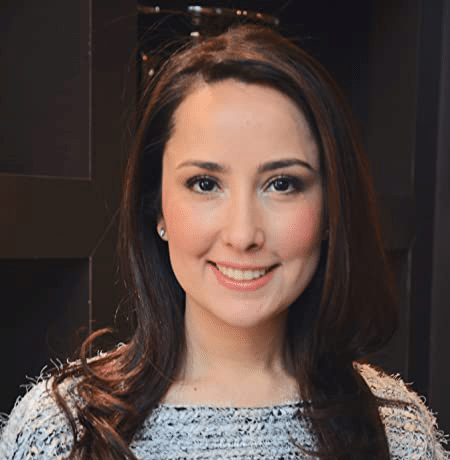Manhattan lawyer turned author and literary agent, Cecilia Lyra has carved out a dream all her own. Author of The Sunset Sisters which releases in June and lover of books about strong women, Cecilia is the embodiment of #girlpower. If you have not met Cecilia, you are about to fall. Hard. She talks to Women in Our Town about how listening to her inner voice and honoring her unique story led her to her dream.
Can you tell us a bit about yourself?
I’m a Brazilian-born, third-culture kid who grew up in international settings with both too much and too little freedom. From an early age, I was told I should be a lawyer because I enjoyed arguing. In my family, debates were commonplace at the dining table—and everywhere else for that matter. Looking back, I’m not sure if my tendency to engage in verbal sparring stemmed from genuine delight as much as it did from being both exceedingly opinionated and easily triggered. I’m also not sure I was told I should be a lawyer, but rather that I would be one. I’m fairly certain it was more directive than guidance. Anyway, I did go to law school and I did practice law for several years. I made my parents proud. I could even say I made myself proud. But I wasn’t happy. That came later, when I started writing.
When did you first start writing?
I’m an introvert (no one ever believes me when I say this because people tend to associate introvert with shy). I think too much, and I feel even more than I think, which probably explains why books have always been my refuge. It’s a way of spending time with people without actually having to, you know, spend time with people. Growing up, stories provided me with a means of escape and connection. They helped me make sense of the world. And writing was a way to make sense of my world.
As a child, I kept journals. Within the confines of those spiral notebooks, I held nothing back. I dissected my motivations and actions and examined people around me, particularly my family members. I shared every thought and feeling I had with those pages. I didn’t know that what I was doing was therapeutic, but it absolutely was. Transforming my emotions into words kept them from overpowering me. And it went beyond journaling. I loved it when teachers assigned any type of creative writing, be it poems or short stories. I delighted in creating worlds, inhabiting them with people, and getting them into trouble, only to have them achieve redemption at the end.
Storytelling kept me sane (as sane as I’d ever be, anyway). Reading and writing weren’t just hobbies for me, they were a form of self-care—they still are. I suppose my journals were my first foray into writing. But I also remember the first time I attempted to write long-form fiction. I was in the sixth grade and my story was essentially a well-intentioned but still undeniably plagiarized version of the Sweet Valley novels. I wonder if I can get away with calling it fan fiction?
“Writing brings me unbridled, unparalleled joy—but it is not without its challenges.”
Writing brings me unbridled, unparalleled joy—but it is not without its challenges.
What inspired you to write The Sunset Sisters?
My first ‘real’ attempt at writing led to The Sunset Sisters, my debut novel that’s set to be published later on in June. It’s the story of Cassie and Julie, half-sisters born two weeks apart who have been estranged for fourteen years. In order to inherit their grandmother’s house in the Hamptons—the same house where, at the age of nine, Cassie and Julie first met—they must spend a summer there, together. This is absolutely not the story of my life. It’s fiction. Made-up. But, in a sense, it is also real because the emotions woven into the story are real. As I revisited my first draft, years after I initially wrote it, I realized just how much of my old journals ended up in there.
The emotional baggage that Cassie and Julie carry—their fears, anxieties, traumas, hopes, dreams, and, above all, the secret that shaped them—was drawn from my life. And, of course, the bond the two sisters share is similar to the one I share with my sister: inimitable and unbreakable. (I am very close to my sister. We live in the same building. Some people say we’re ‘too close’ but these people are wrong. Obviously.)
What motivated you to leave the law and pursue a career in the literary field?
This isn’t as good of a story as I’d like it to be. I’d love to be able to say that I quit because I experienced a life-changing epiphany, that my heretical career move came from a place of courage and passion and nonconformity. The truth is a lot less inspiring. The decision to take a year off—and that’s all it was supposed to be: one year—came after a big move that had left me feeling burnt-out.
It wouldn’t have happened without my husband, and not just because it was his idea. He supported me in every sense of the word, encouraging me to spend my days doing whatever I wanted. We were living in Rio de Janeiro at the time. If I were a normal person, I would’ve spent my days at the beach (Rio is notorious for its paradisiac beaches). Because I’m weird, I spent my days reading. Soon, I began writing. And that’s how The Sunset Sisters came to be. After a few months of writing, my husband pointed out that he’d never seen me happier, joking that it was almost like he was now married to a different woman. (Bruno and I are not happy-go-lucky people. We’re analytical, critical, and hard on ourselves. But we’re kind and generous with each other. Him especially.)
I never did go back to practicing law. I was offered a position at a university, which I accepted in no small part because it helped assuage my feelings of guilt and inadequacy over having wasted my education. I taught Corporate and Contract Law, twice a week, and surprised myself by enjoying it immensely. I still talk to a few former students and I’m beyond proud of all they’ve accomplished. In fact, I only quit because we moved again, this time to Toronto.
I would love to say that I never looked back, but that’s not true. Writing brings me unbridled, unparalleled joy—but it is not without its challenges. I’ve wondered if I did the right thing. If I should’ve stayed the course. If I should’ve never taken that course in the first place. This is especially true whenever I get rejected and, let me tell you, being an author is a continuous exercise in rejection. Even the most celebrated, bestselling authors feel this way, whether because they’ve received a harsh review or because they’ve been pigeonholed by the industry or for another reason entirely. It’s only natural to wonder ‘what if’, especially after a setback. We all look back, and that’s okay. Looking back is how we make sense of things. But moving forward is the only way for them to make sense eventually.
I would love to say that I never looked back, but that’s not true. Looking back is how we make sense of things. But moving forward is the only way for them to make sense eventually.
All too often we make safe career choices, foregoing what we love for what will give us a steady income. Do you have any advice for someone who might want to take the plunge and pursue what they love?
In 2018, I enrolled in a post-graduate program in publishing at Centennial College in Toronto. I believe the official name is Publishing: Book, Magazine and Electronic at the School of Communications, Media, Arts and Design. (Yes, the lack of Oxford commas bothers me to no end.) I’m bringing this up because, for one year, I spent my days among young people who were doing just that: pursuing a career doing what they love.
No one goes into publishing for the money. That was quite a change for me—every single one of my classmates in law school was in it for the money, whether they admitted it or not. Attending Centennial’s program was a breath of fresh air (pardon the cliché) because that’s where I befriended a remarkable group of twenty-something-year-olds who, unlike twenty-something-year-old me, were unafraid of listening to their inner voices. Not the inner voice planted in our heads by society, but that voice you’ve heard since you were a kid. Before capitalism and the patriarchy got to you. That voice, it instinctively knows your heart’s desire. Listening to that voice is step one.
Step two is a lot more boring: do research. Go online and read about your passion as a profession. Understand the particular risks, challenges, and difficulties experienced by those who trekked the long journey and eventually made it. But don’t stop there: find the people who tried, failed, and quit. Understand what they went through, too—and not just why they quit, but how they tried, how they failed. Ask them what they’d do differently if they could do it all over again. Ask them for advice—I’m not suggesting you follow their advice; at this point you’re just asking questions. The idea here is not to track down an older, more experienced version of you (there is no such person) who will be able to offer you an instruction manual to success (there is definitely no such thing). The idea is to gather data.
Step three is processing this data as it applies to your specific situation. Is this still something you want to pursue? (Asking this question is very important.) If the answer is yes, it’s time to turn your dream into a plan. Set measurable, realistic goals—ones that are specific to you. Make sure to factor in privileges: ones you have and ones you don’t. Look into ways to connect with your community (e.g. taking a course, joining a workshop, attending a conference). Try to anticipate obstacles and mitigate risks. You won’t be able to foresee everything—no one can—but it helps to come up with strategies. Your plan won’t be a roadmap because you’re paving the road as you go. But it will help remind you of how far you’ve come.
Throughout your journey, don’t be afraid to ask for help, trust your instincts, and, when in doubt, listen to the voice.
Do the research. Find the people who tried, failed, and quit. Understand what they went through, too—and not just why they quit, but how they tried, how they failed.
Is there a particular author or book that has really influenced your writing?
My love of writing came from my love of reading, which means that the authors who have most influenced my writing are the ones whose books I most enjoy.
E.B. White is responsible for making me fall in love with stories. My third-grade teacher read Charlotte’s Web to our class, and I swear, if I close my eyes it’s like I’m listening to Ms. Eleanor’s voice hypnotize me with her magic all over again.
As a kid, I loved Ann M. Martin’s The Baby-Sitters Club and anything by Judy Blume—I still remember being thoroughly convinced that she wrote Tales of a Fourth Grade Nothing for me. (Clearly, I was a self-centered kid.)
In high school, I was introduced to—and fell in love with—Toni Morrison (I read The Bluest Eye multiple times) and Isabel Allende (The House of the Spirits still haunts me). Nowadays, my favorite authors include Chimamanda Ngozi Adichie (Americanah is an all-time favorite of mine), Roxane Gay (please read Bad Feminist if you haven’t already), Curtis Sittenfeld (Sisterland is magical in more ways than one), Liane Moriarty (controversial opinion: The Husband’s Secret is better than Big Little Lies, though they’re both masterpieces), and Emily Giffin (if Baby Proof doesn’t make you cry do you even have a heart?). I could go on. There are too many good authors. Too many good books. I’m not complaining.
The last book I read—and adored— was Exciting Times by Naoise Dolan. It’s set to come out in July. I highly recommend it!
What is the most challenging part of the artistic process?
I’m sure it’s different for every person. For me, it’s understanding that not writing often means writing. Actually, scratch that: not writing is necessary to writing. I am very good at being hard on myself, so when I first began to pursue writing as a career, I was the picture of discipline. I set ambitious, word-count goals. I didn’t allow myself to take time off. My thinking was: I was already doing what I loved — what did I need time off for? Essentially, I assumed I’d achieve success by replicating the behaviors that served me well in my previous career. I was terrified of becoming lazy, of wasting time. Little did I know that all that self-restraint was, in fact, thwarting my writing.
Writing—and this goes for any art, I think—requires space. And I’m not talking about a well-lit room with a desk and computer. I’m talking about mental space. A room of one’s own is nothing without making room in one’s mind. You must allow your mind to wander, to daydream. To fixate and obsess. To revisit what has happened and to imagine what could have happened instead. Ideas need to simmer before they can take shape. It might seem like you’re not working if you’re reading all day, but you are.
Same goes for taking a long walk in nature. Or staring out a window or watching a TV show or chatting with your friends. I promise you: as long as you eventually put pen to paper (or fingers to keyboard), you are on the right track. This sounds lofty, I know. I used to think that, too. But it helps if you think of it like this: art is a portrayal of life. And you can’t portray life without living it first—and then obsessively mulling it over until a story takes shape in your mind.
Writing—and this goes for any art, I think—requires space. A room of one’s own is nothing without making room in one’s mind.
We live in a world where we measure our progress against other people’s success. How does a writer keep that tendency in check?
Don’t compare yourself to another writer. Compare yourself to the writer you were six months ago. One year ago. Five years ago. That’s how you measure progress.
Speaking of comparisons, I’d be remiss if I did not discuss the issue of privilege. And not just the ‘big ones’—racial, economic, gender—though these are, of course, indisputably significant. It’s important to probe further, to think about intersecting privileges, too. We are all privileged in some way. If you’re reading this, you’re privileged in that you are literate and have access to an internet connection. Are you able to climb up the steps to your local library? That’s able-bodied privilege. Can you safely walk at night where you live? That’s privilege. Do you have access to affordable healthcare? That’s called privilege. Can you spend the day talking to people without fear of a panic attack? That’s privilege. If you had a happy childhood, let me tell you: that’s a huge privilege. I am privileged in so many ways. You are, too.
Understanding how you are privileged is key to being an industrious writer, not only because it prompts feelings of gratitude—and, hopefully, makes you less prone to arrogance-—but because it will keep you from engaging in false comparables.
You cannot compare someone who is fortunate enough to have a partner who is able to support them financially to someone who has to pay all of their bills by themselves. You cannot compare someone who spends twenty hours a week doing unpaid, emotional labor (in addition to official, paid labor) to someone with no care-giving responsibilities.
Once, I was chatting with my friends about a great proposal I’d read, one for a Latinx-inspired cookbook. I explained how this author (let’s call her Talitha) had a fresh angle, mouth-watering recipes, but, sadly, no platform, which, in today’s publishing climate, significantly lowered her chances of getting traditionally published. (An aside: I hate that this is the case. But it is the case.)
One of my friends politely challenged this notion, citing her brother, who is a bestselling author with no social media presence. Her implication was: if my brother did it, Talitha can, too. It should be noted that this friend of mine is a wonderful, compassionate person, and her brother is, indeed, a very talented, hardworking writer. He is also a cis, white, straight, middle-aged male whose economic privilege has allowed him to study towards not one, but three degrees in creative writing. He broke into publishing decades ago, he writes fiction—which, traditionally, does not require a platform—and he has no care-giving responsibilities, whereas Talitha is a single mom.
Comparing the challenges her brother faced on his journey towards getting published to the one’s Talitha will face is like comparing a light bulb to a supernova. If Talitha—or any other author like her—were to do that, she’d likely feel frustrated and discouraged. Which is why I encourage any aspiring author to beware of false comparables. Check your privileges. But pay attention to others’ privileges, too. Honor your journey, your story.
I encourage any aspiring author to beware of false comparables. Check your privileges. But pay attention to others’ privileges, too. Honor your journey, your story.
Do you have any final advice for aspiring writers?
Read. Read eagerly, hungrily. Read within your preferred genre. Read outside it. Reread your favorite books. Read the classics. Read contemporary, bestselling authors. Read everything. All authors are readers first.
Also: Figure out what works for you. Honor that. And then challenge it. Here’s what I mean by that: I’ve told you about my tendencies toward self-discipline. I know that about myself. I honor this tendency by staying organized and accountable, and by not being afraid to set boundaries so the people in my life understand that writing is a job, not a hobby. And I challenge it by allowing myself to engage in an activity that might seem purely leisurely (e.g. going for a long walk in nature) but that, in fact, experience has taught me leads to better writing. I’ve been doing this long enough that I’ve learned to reframe certain activities as productive even though I’m sure an outsider wouldn’t agree. (Pro-tip: it does not matter what outsiders think.)
Another example: I have a friend who is a writer and, by her own account, the world’s biggest procrastinator. She calls herself lazy, but I think that’s too simplistic a characterization. In fact, she is someone who is very comfortable indulging in leisure, which is a quality I greatly admire. She is charismatic, playful, and expansive. She also has the best story ideas, many of which were inspired by her busy social life. If left to her own devices, she’d spend all of her free time talking to friends, preferably over wine and pasta. And she honors who she is—an extrovert who loves to have fun—by doing just that. But that’s not all she does. She challenges herself by tapping into her inner disciplinarian. She’s figured out a goal system that works for her (word-count based; whereas I prefer time-based goals), as well as creative ways to hold herself accountable (one involved telling me a secret and instructing me to reveal it to the world if she didn’t finish her latest draft by a certain day — I’m very thankful she finished!).
My point is: there is no formula. Telling someone ‘set goals’ and ‘treat it like a job’ if you are naturally prone to self-discipline might lead to stilted writing.
Recommending that a perfectionist follows time-specific goals might lead to the person writing—and then deleting—all of their work, which would mean they’d never finish anything. Suggesting that an extrovert lock herself up in a cabin in the woods until she reaches ‘The End’ will likely kill that person’s creative energy. Advocating that all writers get up at 4am to write will frustrate nocturnal storytellers. Listening to advice is important but listening to yourself is even more. At the end of the day, if you are writing, if you are finishing manuscripts, you are on the right track.
Cecilia’s debut novel, The Sunset Sisters releases June 2020 Bookouture/Hachette. It was published in Germany as Sisters for a Summer where it topped the best-seller list.
Cecilia is also an assistant agent at The Rights Factory where she is seeking commercial, adult Book Club fiction with layered characters and plot twists. Do not send her a manuscript where the dog dies. Cecilia cannot handle it.
You can pre-order a copy of The Sunset Sisters from Amazon, Apple Books or Kobo.
For more of Cecilia, follow her on Instagram






